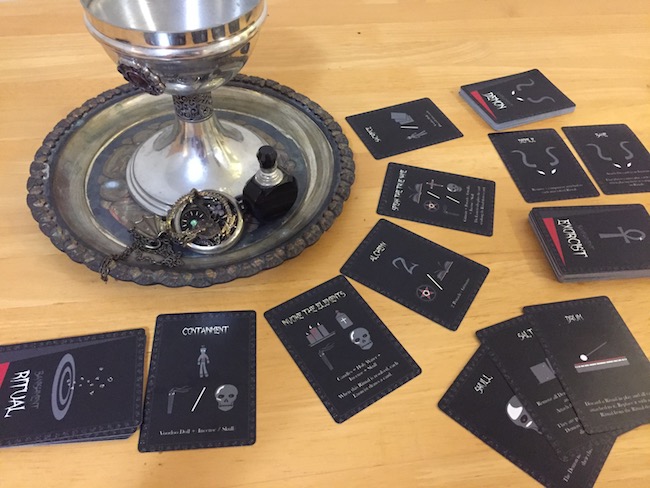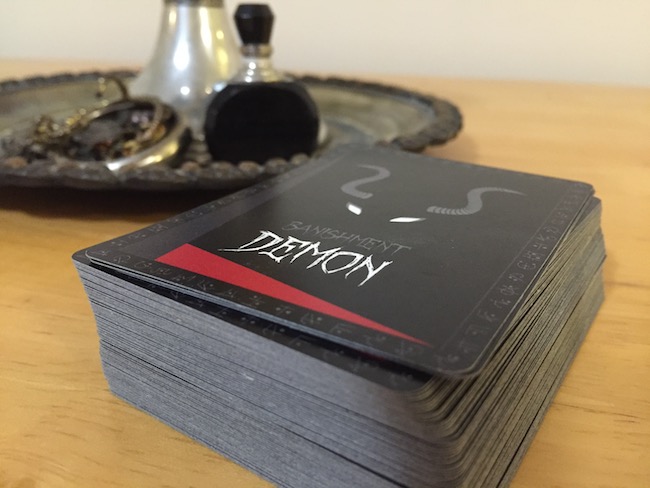
In what the media have begun to call the “Golden Age of Gaming” over the last few years, there has never been a better time to find such a diverse range of genres and types of games to cater to the tastes of all individuals. At the Perth Games Festival, I had the pleasure of playing a round of Banishment – a supernatural/fantasy themed co-op card game. The print run of cards looked great, and both the concept and execution were easy to understand and follow with a very seamless quick-play format. Graciously, the creators and runners of Banishment by Dark Mirror Games Kim and Jonathan have answered some of my questions about the game and their company!
What was the inspiration for making a card game such as Banishment?
We came up with the idea during the 2016 Global Game Jam. Neither of us had any programming skills, which largely limited us to tabletop games. We’re both also into card games such as Magic, Hearthstone and Ascension, so a card game was a good fit. Mechanics-wise, we just spent some time throwing broad ideas at each other until we found one we were excited about and went from there.
Obviously, there’s a lot of inspiration Dark Mirror Games takes from fantasy and supernatural lore, what made this the particular genre you wanted to work in?
We’ve both been massive fans of the fantasy genre since we were children. I think we both appreciate the limitless nature of fantasy and its potential for all sorts of surreal, creative and bizarre situations. That said, we’re not necessarily planning to limit ourselves to one genre in the future.

As opposed to a video game with technical design issues, what are some of the challenges of making a card game?
Kim: The two biggest challenges for me are getting the balance right and identifying any issues with user experience (are there any combos that make a card useless, which cards are the most/least useful, can people read the font and understand the instructions, etc.). I imagine the latter would be the same for a video game. Most of our development time was spent testing for these issues.
Jonathan: Playtesting is a lot harder. You can’t just run the program and see what happens or e-mail the file to a friend who has a spare 15 minutes, you need to persuade a bunch of people to play it in person.
For those who are unaware, what can you tell us about your roleplaying adventure “Dream of the Djinn”?
Jonathan: That was Kim’s creation. I like to think of it as the most interesting dungeon in the world. Kim’s love for old school rogue-likes and exploration games definitely shone through.
Kim: It’s a dungeon crawl covering 39 rooms and 12-15 hours of gameplay emphasising creative problem solving. My favourite part of tabletop RPGs is coming up with creative or strategic solutions to problems (it makes me feel smart), so I created a scenario full of as many surreal traps and puzzles as possible to give players the opportunity to do just that. It’s all about maximising character fatalities cunning and minimising combat.
What do you feel separates Banishment from other card games such as Love Letter, Smash Up and Gloom amongst others?
Jonathan: There’s a lot of fun, quick card games out there, but a lot of them are more party games in the style of Cards Against Humanity. Love Letter and Coup are based on bluffing, Gloom is more a story game, and Smash Up is a fun competitive free for all.
We set out to make a game we would like to play, so we didn’t base it on anything. If I had to compare it with something, it would be Magic: the Gathering, as Banishment is highly interactive, with constant disruption of the other team’s plans. I’d also compare it with Betrayal on the House on the Hill after the haunt has started, as it’s also a cooperative team game against a big bad demon.

Are there any plans to release expansions or alternative versions of Banishment in the future?
We definitely have solid plans for a number of expansions and variants, but it’s going to depend on how well the Kickstarter campaign does. We started up Dark Mirror without an existing capital base, so the campaign will likely be a ‘make or break’ point. But if we can finance it, it will happen.
What’s next for Dark Mirror Games after Perth Games Festival – are you testing the game elsewhere or moving on to a new project?
Kim: We’ll be ready to Kickstart Banishment soon and expect to do so in November. If successful, we’ll focus on getting it and any expansions produced. We do have plans for future projects, but what happens next will largely depend on the outcome of that campaign.
Jonathan: A programmer we met at the festival also approached us about adapting Banishment into an app, so if the game takes off, that’s definitely an avenue we’d be willing to explore!
How was the experience in regards to feedback and player engagement for Dark Mirror Games and Banishment?
Seeing as it was our first official event as a business, I don’t think either of us were expecting the extent of the positive response we received at the Perth Games Festival. We had a full table all day, with a lot of people telling us they were interested in the game and playing it multiple times. It was really nice to have such positive feedback, and wonderful to have such an encouraging response.

If you could offer advice for people looking to get into the board/card game scene, what would you tell them?
To give it a go, but don’t give up your financial security. It can be extremely daunting to look at the high costs of tabletop game production and think that making it into a business is impossible.
We’re new to this industry, and both still work full time in other jobs, and whether we can take Dark Mirror Games further will depend much on the outcome of the Banishment Kickstarter. We live in the age of crowdfunding, so you never know.
Tabletop games do have an advantage over video games in that you don’t need programming skills to make something that’s fun and engaging to play.
If making a profit isn’t your primary concern, I think there’s a lot to be said for the fun of the creative process itself: doing what you love and going down to local gaming events to find people who enjoy what you’ve made. This is what makes us happy. Everything else, at least for us, is a bonus.
Do you feel that there’s anything that could be improved or changed about Banishment – and if so, what?
Kim: There’s still some testing to be done in terms of balancing the game for 3 and 5 players, but I think we’re very close now. I do think Banishment has the potential to be very modular, and we’re pretty excited about developing variants and expansions, so we expect a lot of future additions there.
Jonathan: The base set’s gameplay is pretty much locked in. I think one of the key things now will be making sure our player experience is optimised, making sure the visual design of the cards, the font and the rulebook are polished to make it as elegant and easy to understand for a new player as possible.
For more information about Banishment and Dark Mirror Games, please visit: https://darkmirrorgames.com











